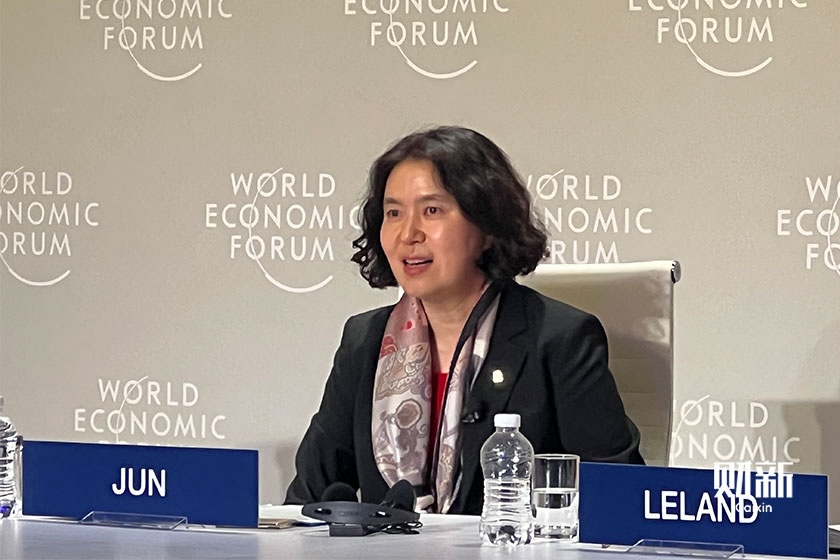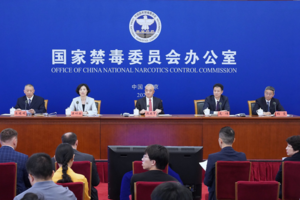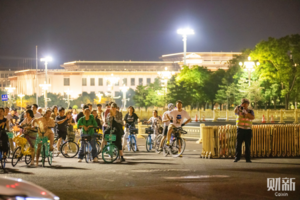UN Refugee Official Calls for Broader Supports to Empower Those in Exile
Listen to the full version

Refugees forced from their homes should receive the support they need, in education, health and livelihoods, to live productive and dignified lives while in exile, said a senior official of United Nations High Commissioner for Refugees (UNHCR), calling on the international community to play its part.
Speaking exclusively to Caixin on the sidelines of the 15th Summer Davos Forum in Dalian, UNHCR’s Regional Director for Asia and Pacific Hai Kyung Jun said: “I think it is important to raise public awareness of the resilience and strength of refugees, despite the challenging circumstances they may find themselves in.

Download our app to receive breaking news alerts and read the news on the go.
Get our weekly free Must-Read newsletter.
- DIGEST HUB
- UNHCR's Regional Director for Asia and Pacific, Hai Kyung Jun, emphasized support for refugees in education, health, and livelihoods, highlighting issues in Myanmar and Afghanistan.
- Jun stressed the importance of raising awareness about refugees' resilience and mentioned ongoing support and protection efforts in countries like Bangladesh, Pakistan, and Iran.
- Jun advocated for the private sector's involvement, particularly in climate resilience and infrastructure projects, and noted China's significant role in addressing regional refugee issues.
Refugees forced from their homes should receive necessary support in education, health, and livelihoods to live dignified lives, highlighted Hai Kyung Jun, UNHCR’s Regional Director for Asia and Pacific, at the 15th Summer Davos Forum. [para. 1][para. 2] She stressed the need to raise awareness about the resilience and strength of refugees amidst challenging circumstances. [para. 2] The United Nations High Commissioner for Refugees (UNHCR), established in 1950 in Geneva, now operates in over 130 countries, providing protection and support to those fleeing conflict and persecution, and seeking long-term solutions for them. [para. 3] UNHCR collaborates with governments and partners to ensure compliance with refugee rights and asylum laws. [para. 4]
Jun, with over 20 years in the humanitarian field, has previously worked with UNHCR in Afghanistan and Myanmar, and UNICEF in Chile, before her current role since February 2024. [para. 5] Key refugee issues in the Asia-Pacific region include the situations in Myanmar and Afghanistan, which have led to massive refugee movements to neighboring countries. [para. 6] The 2017 military operations in Myanmar against the Rohingya forced over 750,000 to flee to Bangladesh where nearly 1 million still reside in camps. [para. 7] Jun emphasized the importance of ensuring safe, dignified return conditions for Rohingya refugees while providing Bangladesh with humanitarian assistance including food, health, shelter, and protection. [para. 8][para. 9] Additionally, UNHCR seeks resources from various donors, including governments and private sectors, to aid their efforts. [para. 9]
In terms of Afghan refugees, there are 6.4 million registered worldwide, with 2.2 million in Pakistan and Iran. [para. 10] Afghanistan faces severe humanitarian crises and natural disasters, making support to Afghan women and girls particularly crucial. [para. 11] Jun noted refugees have skills that aid self-reliance and community contributions, highlighting private sector involvement as beneficial. [para. 12] However, the Asia-Pacific region is significantly affected by climate change, which exacerbates risks for refugees living in extreme weather-prone areas. [para. 13] Local government and private sector support is essential for enhancing climate resilience among vulnerable communities. [para. 14]
Refugee-host communities also face challenges; thus, resilience projects should support both refugees and local communities. [para. 15] Jun acknowledged the UNHCR’s collaboration with the private sector in providing shelters, infrastructure, and livelihoods for refugees. [para. 16] Refugees with education and training can contribute to local economies with private sector backing, creating potential win-win situations. [para. 17] Chinese enterprises are noted for their contributions, not only financially but also in offering solutions, such as providing renewable energy like solar panels to refugees. [para. 18]
China, neighboring Myanmar and Afghanistan, has a crucial role in addressing refugee issues, leveraging its experience as a permanent UN Security Council member and its success in poverty eradication. Jun emphasized that China’s experience could benefit other countries. [para. 19]
- 1950:
- The United Nations High Commissioner for Refugees (UNHCR) was set up to coordinate international action to protect refugees, forcibly displaced and stateless people.
- From 2013 to 2014:
- Hai Kyung Jun served as UNHCR Assistant Representative in Afghanistan.
- 2017:
- A military operation against the Rohingya in Rakhine State caused more than 750,000 of them to flee Myanmar for Bangladesh.
- From 2020 to 2022:
- Hai Kyung Jun worked as UNHCR Representative in Myanmar.
- By February 2024:
- Hai Kyung Jun became Director of the UNHCR Regional Bureau for Asia and the Pacific.
- GALLERY
- PODCAST
- MOST POPULAR







 Sign in with Google
Sign in with Google
 Sign in with Facebook
Sign in with Facebook
 Sign in with 财新
Sign in with 财新